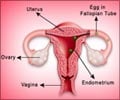There is an increased risk of severe perineal tearing during childbirth in women who had such a tear in a previous delivery, suggests a study that explores mode of delivery in subsequent pregnancies.

Most women tear to some extent during childbirth and in some women the tear may be more extensive. A third degree tear extends downwards from the vaginal wall and perineum to the anal sphincter, the muscle that controls the anus and a fourth degree tear extends to the anal canal as well as the rectum. In England, the rate of reported severe perineal tears has tripled from 1.8% to 5.9% between 2000 and 2012.[1]
The study used a cohort of 639,402 first-time mothers who had a vaginal delivery of a single baby between April 2004 and March 2011 and a second birth before April 2012. Data came from the Hospital Episode Statistics (HES) which includes all maternity admissions in NHS hospitals.
Results show that the prevalence of third or fourth degree tearing at first birth for the cohort was 3.8%. Among women who had a third or fourth degree tear at first birth, 24.2% were delivered by elective caesarean section, compared with 1.5% of women who did not tear at first birth.
Furthermore, the report found that among women who had a vaginal delivery at second birth, the rate of a severe tear was 7.2% in women with a tear at first birth, compared to 1.3% in women without, a more than five-fold increase in risk.
Other risk factors to increase the risk of third and fourth degree tearing at second birth include; high birth weight, forceps delivery and the presence of shoulder dystocia. Additionally tearing was higher in older women, women living in the least deprived communities and in Asian women, notes the report.
Dr Leroy Edozien, a consultant obstetrician from the University of Manchester and co-author of the study said:
Dr Ipek Gurol-Urganci from the London School of Hygiene and Tropical Medicine and co-author added:
"Our results emphasise the need for clear national guidance for healthcare professionals on the optimal mode of delivery for women with a prior severe perineal tear so that they can be counselled appropriately."
John Thorp, BJOG deputy editor-in-chief said:
"This study captures over 96% of all deliveries in NHS hospitals in England over a 7 year period, and represents the first piece of research into the mode of delivery and recurrence rate in a pregnancy subsequent to a third or fourth degree perineal tear.
"The results highlight the increased risk of severe tearing in women who have a third or fourth degree tear in their first delivery and therefore will help women along with a multidisciplinary team of healthcare professionals to make decisions about the mode of delivery in future pregnancies to ensure the best outcomes for mother and baby."
Source-Eurekalert
 MEDINDIA
MEDINDIA




 Email
Email







